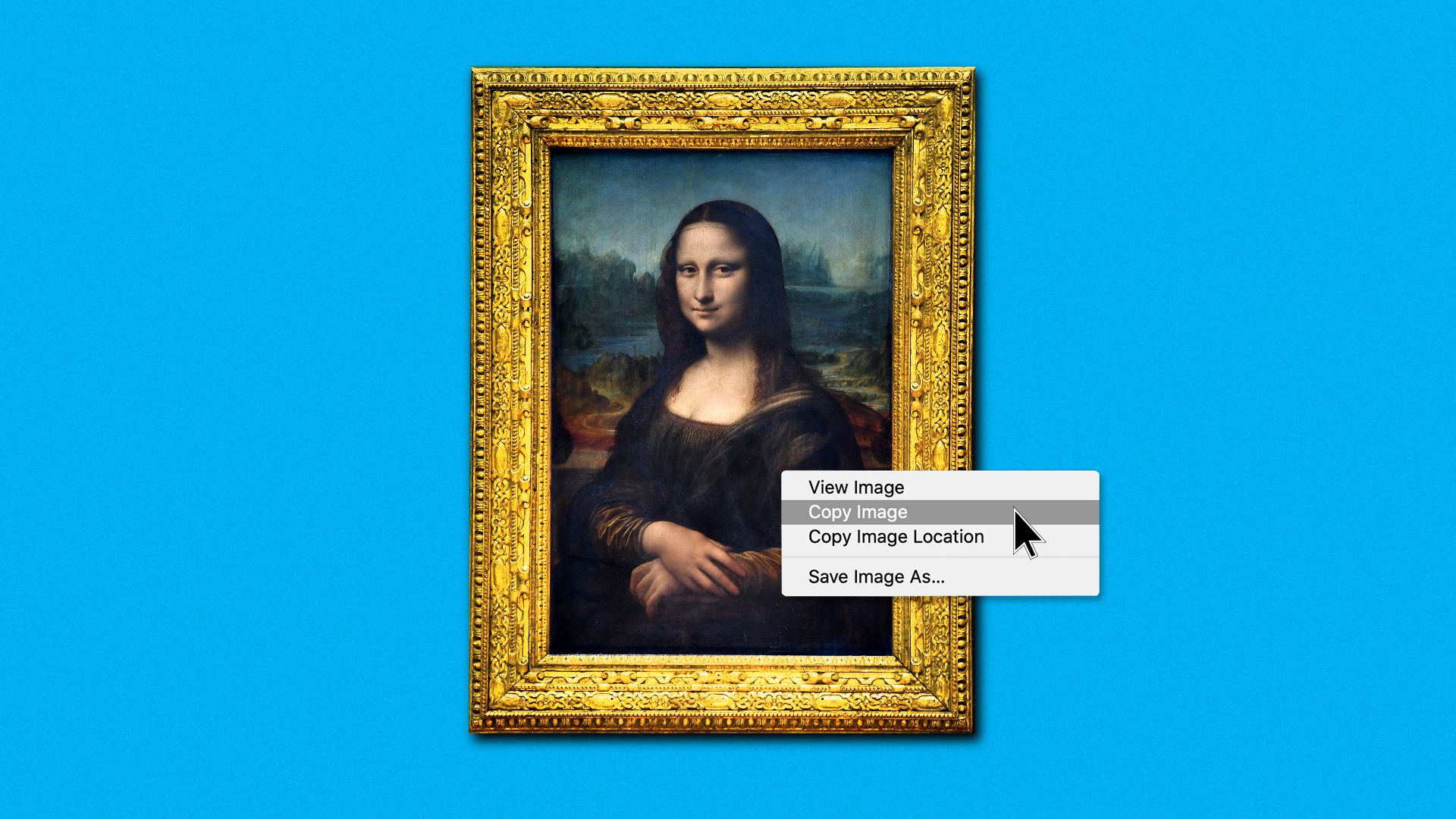The future of owning content online
Add Axios as your preferred source to
see more of our stories on Google.

Illustration: Aïda Amer/Axios
Thirty years into the internet era, content creators in many industries, like digital news publishing and music, still believe copyright regulations favor the interests of digital content distributors and make it difficult for them to make money.
The big picture: Countries around the world are trying to address outdated copyright rules to protect the owners of intellectual property across several industries.
Driving the news: The United States-Mexico-Canada Agreement (USMCA), which is set to soon replace the North American Free Trade Agreement (NAFTA), significantly modernizes rules around intellectual property (IP), like digital music rights, movies e-books.
- It requires strong standards against parties that seek to circumvent protection measures that are used often to protect that type of content.
- It also includes a provision that provides legal protection to tech platforms for the third-party content that they host or process on their platforms, a provision that House Speaker Nancy Pelosi fought hard to leave out.
In the digital news publishing business, global copyright provisions are trying to tackle compensation to publishers for the distribution of their content.
In Europe, the European Parliament in March approved a copyright directive that includes a provision to force tech platforms to pay publishers for their content.
- In October, France became the first member state to ratify the law. Shortly after, French policymakers accused Google of undermining the rules and said it would sanction Google for using tactics to avoid paying publishers on Google News.
- Google has argued that restrictive copyright rules being proposed by the EU, similar to those that passed in Spain in 2014, would hurt small publishers. There have been examples of this argument being made by smaller publishers themselves.
In the U.S., a prominent newspaper trade group, The News Media Alliance (NMA), is also trying to pressure Google to pay publishers. A report last month from the News Media Alliance (NMA) challenged Google's finding that traffic to Spanish publishers plummeted after Google News shut down in Spain in 2014.
- The group's CEO, David Chavern, said in an interview with Axios that Google is using this narrative to lobby against future copyright rules in other countries that would require them to pay out publishers.
- Google points to a survey that suggests that traffic to Spanish publishers plummeted in the immediate aftermath of its exit from the Spanish market. But Cedro, a Spanish non-profit association that collects and distributes payments to publishers from distributors, commissioned its own studies and found that Google's departure from Spain was "non significant for the top 20 newspapers," but varied for smaller publications.
- In an interview with Axios, Cedro CEO Jorge Corrales said news traffic has migrated instead towards two news aggregators that pay publishers. "The intellectual property rules haven't stopped the development of these companies ... It's an example of a project done right with IP rights of content owners in mind."
In Australia, the digital platforms arm within the Australian Competition and Consumer Commission last week put tech companies on notice if they're unable to address power imbalances with media companies. Google says in a statement to Axios that it's engaged closely with Australian Competition and Consumer Commission.
Meanwhile, Google has been fighting many copyright rules around the world that it considers to be too broad.
In the music industry, Google-owned YouTube last year set up one of its most aggressive consumer-facing lobbying efforts ever to fight Europe's new copyright directive. The directive passed alongside the rule that forces Google to pay publishers in Europe.
- Currently in the U.S., copyright laws favor distributors of music over owners of music rights. They place the burden on rights holders to track down infringing material file by file and send take-down notices. Content creators say this precedent has led to a game of whack-a-mole, because new files just pop up immediately.
- What's next: The Copyright Office is reviewing the issue and is soon expected to issue a report on some of the problems.
- Groups that represent content creators would like to see some incentive for the tech companies to work with rights holders to come up with a voluntary solution to better police for copyrighted material.
The other side: Some legal scholars and activists feel instead that the U.S. copyright regime is too protective of corporate ownership at the expense of fair use and public access to works, pointing to Congress' repeated extension of the copyright term.
The bottom line: The power pendulum is slowly swinging back to owners of intellectual property, but many content owners still have to fight to make money from the distribution of their work online.

